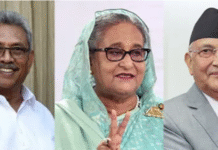ICC AND ROHINGYA REFUGEES
Bangladesh demands accountability, peace and justice

In “Dhaka, Ottawa and The Hague: Rohingya Convergence” (The Daily Star, April 19), I referred to the legal process commenced by the International Criminal Court (ICC) in relation to the arrival of the Rohingya refugees in Bangladesh. On April 9, the Chief Prosecutor of ICC made an application on jurisdiction under the Rome Statute. The question raised was whether the ICC may exercise jurisdiction under the Rome Statute over the alleged deportation of the Rohingya people from Myanmar to Bangladesh. On April 11, the Pre-Trial Chamber gave its favourable decision.
On May 7, a letter was sent by the ICC Prosecutor to the government of Bangladesh seeking the latter’s opinion on the issue of jurisdiction by June 11 and June 20 has been set for a closed-door hearing on the jurisdictional question. The ICC Prosecutor has already very eloquently argued that the court has territorial jurisdiction due to the fact that the deportation of Rohingyas from Myanmar involved movement into Bangladesh, which is a party to the statute. According to the Rome Statute, territorial jurisdiction is not limited to the place where the coercive act took place, Myanmar in this case, but to all states involved in the deportation across an international border, concluding at the receiving state, Bangladesh in this case.
The ICC Prosecutor sought opinion from the Pre-Trial Chamber relating to the exercise of jurisdiction for alleged crimes prohibited by Article 7(1)(d) of the Rome Statute relating to “deportation or forcible transfer of the population” as a crime against humanity. Experts believe that in the absence of a Security Council referral, or Myanmar unexpectedly submitting itself to ICC’s jurisdiction, this specific crime would be the only jurisdictional hook for ICC on the Rohingya matter.
In addition to the Prosecutor’s assertions on jurisdiction, and hopefully Bangladesh will strongly agree with her assertions, the following are some points that Bangladesh could consider in formulating its response:
As a party to the ICC, Bangladesh has a duty to carry out its obligations under the Rome Statute, and to promote and advance the overarching purpose of the ICC in attaining justice and accountability for alleged international crimes perpetrated by Myanmar forces.
The territory of Bangladesh is not merely a recipient of the effects of the crimes but is intrinsically part of the commission of the crimes, given that the conduct of deportation is not complete until the deportees have crossed an international border. In other words, the crime of deportation could not be made out without access to another state. This makes Bangladesh, in plain language, a “scene” of the crime. Bangladesh, therefore, must consider the crimes as having been partially conducted on its territory, hence bringing them within ICC’s jurisdiction.
Bangladesh is currently the host to the most important evidence relating to not only the crime of deportation that may fall within ICC’s jurisdiction, but far more serious crimes, such as genocide and other crimes against humanity (e.g. murder, rape), and war crimes (e.g. wilful killing, destruction of property, torture, attacks against civilian objects) that are outside of the ICC’s jurisdiction due to Myanmar not having acceded to the Court’s jurisdiction. Bangladesh is, therefore, uniquely positioned to collect, preserve and analyse this evidence and has interest in seeking ICC’s involvement.
As a sovereign state, Bangladesh’s national interest is at stake, and the country has a moral and legal responsibility to exercise jurisdiction over crimes committed across an international border that occur upon its territory, applying its domestic criminal laws. Bangladesh also has an obligation, as a party to the ICC, to prosecute international crimes that occur within its jurisdiction.
The principle of complementarity governs the exercise of ICC’s jurisdiction vis-à-vis that of Bangladesh over the crimes committed, with Bangladesh having the first responsibility and right to prosecute international crimes.
The ICC may only exercise jurisdiction where Bangladesh fails to do so. In light of this, any view expressed by Bangladesh relating to ICC’s jurisdiction may be taken as a statement of the state’s intention and willingness to prosecute the crimes nationally. In the case that Bangladesh is unwilling or unable to prosecute the international crimes, it must refer the crimes to the ICC and support the Court’s arguments asserting jurisdiction.
Bangladesh needs to be mindful of the broader interest of justice and accountability while formulating its views on ICC’s jurisdiction over the crime of deportation under Article 7(1)(d).
In today’s tumultuous world, peace and justice are becoming elusive goals both nationally and among nations. The attainment of peaceful and inclusive societies is now an integral part of the 2030 Agenda for Sustainable Development. Bangladesh has achieved majority of the Millennium Development Goals and has won many other accolades since its independence in 1971 despite formidable odds. Bangladesh is now uniquely poised to achieve middle-income status by 2021. But there are serious threats that could derail Bangladesh from its plan. The presence of Rohingya refugees in Bangladesh is certainly one of them. Despite such threats, the prime minister took the bold decision to accept and provide sustenance to Rohingya refugees. She has been recognised globally for this decision.”Bangladesh, Burma and the Rohingya Crisis”, a recent House of Commons report, observed “the Bangladesh Prime Minister…must be thanked and commended for the way sanctuary was provided to the Rohingya.”
The recent victory of Mahathir, who felt obliged to return to politics from retirement at the age of 92, has given him the mandate to establish accountability in Malaysia. This should be a source of inspiration for us in Bangladesh. Prime Minister Hasina and her government now have the opportunity to play a very significant role in the world arena by placing the matter of international accountability of the Myanmar regime’s acts vis-à-vis the Rohingya before the ICC. As Bob Rae pointed out in his recent report, “Tell Them We’re Human”, calling for accountability is not a zero-sum game. Rae stated succinctly, “Rights and development must go together.”
The government of Bangladesh has to be far-sighted in presenting its case to assist the ICC to advance international law and accountability. Given the fact that Bangladesh has already won the hearts and minds of millions of ordinary people by its unprecedented generosity and hospitality, Prime Minister Hasina’s government has to take the moral high ground. Whatever the outcome of the ICC process, history will record Bangladesh’s desire for global peace and justice under the leadership of Prime Minister Hasina if the letter and spirit of accountability is embodied in the response to be submitted by June 11, 2018.
Manzoor Hasan, OBE, Barrister-at-Law is the executive director of Centre for Peace and Justice, BRAC University. The views and opinions expressed in this article are those of the author.
Email: mhasan56@gmail.com
Source: The Daily Star.










Thanks for the opinion! Indeed, it’s a legal, humanitarian, and moral obligation for Bangladesh to pursue the case to get justice for the crimes committed against the Rohingya people. Best – Sultan Chowdhury, Potomac, MD, USA